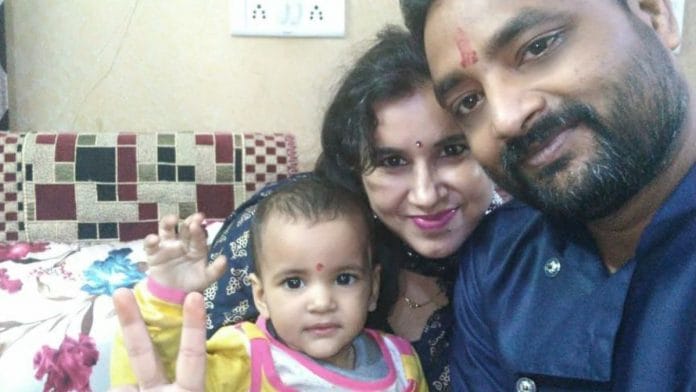New Delhi: Until a week ago, Babita Gupta had been thinking about how she could celebrate her daughter’s second birthday come 1 May. Dhanishtha’s first birthday took place during Covid-19 lockdown, which meant there had been no big celebration.
This week, the 32-year-old was arranging the child’s funeral.
While she goes through videos and pictures of her daughter, in the background is a photo adorned with a marigold garland and roses. Babita is in tears as she remembers the child, but she can’t help smile a little. The infant helped save five lives.
The 20-month-old is India’s youngest cadaver organ donor. Her heart, liver, both the kidneys and both corneas were passed on to other patients.
A cadaver donor is one who is brain dead. Typically, the heart, lungs, kidneys, liver and pancreas are harvested from such donors.
Dhanishtha had fallen from a balcony of her home, which is on the first floor, while playing. Unconscious, she was rushed to the hospital. Four days later, on 11 January, doctors at Delhi’s Sir Ganga Ram Hospital declared her brain dead. While all her organs were working well, she would never wake up.
Her parents Babita and Ashish Gupta said they surprised themselves when they decided to donate the child’s organs.
“When we were staying at the hospital, we saw many patients like us who were in dire need of organs. Our daughter was declared brain dead, but we thought we could keep her alive through others by donating her organs,” said Ashish, who works in a private bank.
Dr D.S. Rana, chairman of Sir Ganga Ram Hospital, said the family’s decision was noble and praiseworthy, and could motivate others to similarly donate organs.
“At 0.26 per million, India has among the lowest rate of organ donation. On an average, 5 lakh Indians die every year due to lack of organs,” he said in a statement Thursday.
Also read: Girl gets recovered Covid-positive sister’s liver in ‘first-of-its-kind’ transplant in Delhi
‘Did not want another mother in my situation’
For organ donation, medical suitability is decided at the time of a person’s death. Healthy organs are transplanted as soon as possible, and every organ has a different shelf life.
For Dhanishtha’s parents, the decision wasn’t an easy one. Ashish says her death had already caused a lot of mental trauma for the family.
“It was a tough decision, but it felt right.”
Babita, a primary school teacher, said she was initially scared at the thought of a post-mortem, but eventually overcame her fear.
“When I was told that a post-mortem will be performed on my daughter, it sent shivers across my body. The mere thought of imagining a cut on my daughter’s body made me uncomfortable and nauseous. I was pleading (with) the doctors (to) not perform a post-mortem,” she said.
“Although she fell from the first floor, she did not have any external injuries. I wanted to make her wear her favourite dress during the last rites,” Babita added.
Then she saw other parents at the hospital and couldn’t help thinking about how Dhanishtha could save them some trauma.
“I saw a mother, whose five-year-old’s heart had failed. She was in pain and crying. I saw myself in her shoes. That is when I realised that even though I was in pain, I did not want another mother to be in a situation like me.”
Now, though Dhanishtha is not physically present, Babita said it feels like she is alive through the people who received her organs.
Also read: ‘Don’t take your organs to heaven with you’ — Govt urges Indians on Organ Donation Day
‘Counselling helped us see benefits’
Dhanishtha is the first case of an organ donor in the family. No one’s organs had been donated in the family nor did they know of anyone who had.
“I had heard about it, but was ignorant,” said Ashish, adding, “I didn’t pay any attention to it before because we live in a society where organ donation is still a taboo.”
“But through the right kind of counselling, we were able to understand the importance and benefits of it. We made sure there is complete transparency in the process.”
Dhanishtha’s grandfather Mathura Prasad Gupta said he was always against organ donations due to superstitious beliefs, but it was his son and daughter-in-law’s decision and courage that changed his mind.
“I used to believe that if one donates a particular organ, in the next birth cycle, they are deprived of that organ or are born with some dysfunctionality. But after counselling and looking at the faith of my kids, I had to step aside,” he said.
“There were also many of our relatives who raised questions and expressed their scepticism. Some also said we were doing this for money, the way people sell kidneys for money. But we did not hear anyone’s opinion,” he said.
Also read: How I led the team that carried out India’s first hand transplant







This brought tears to my eyes.
Great deed by the family. May the girl rest in peace.